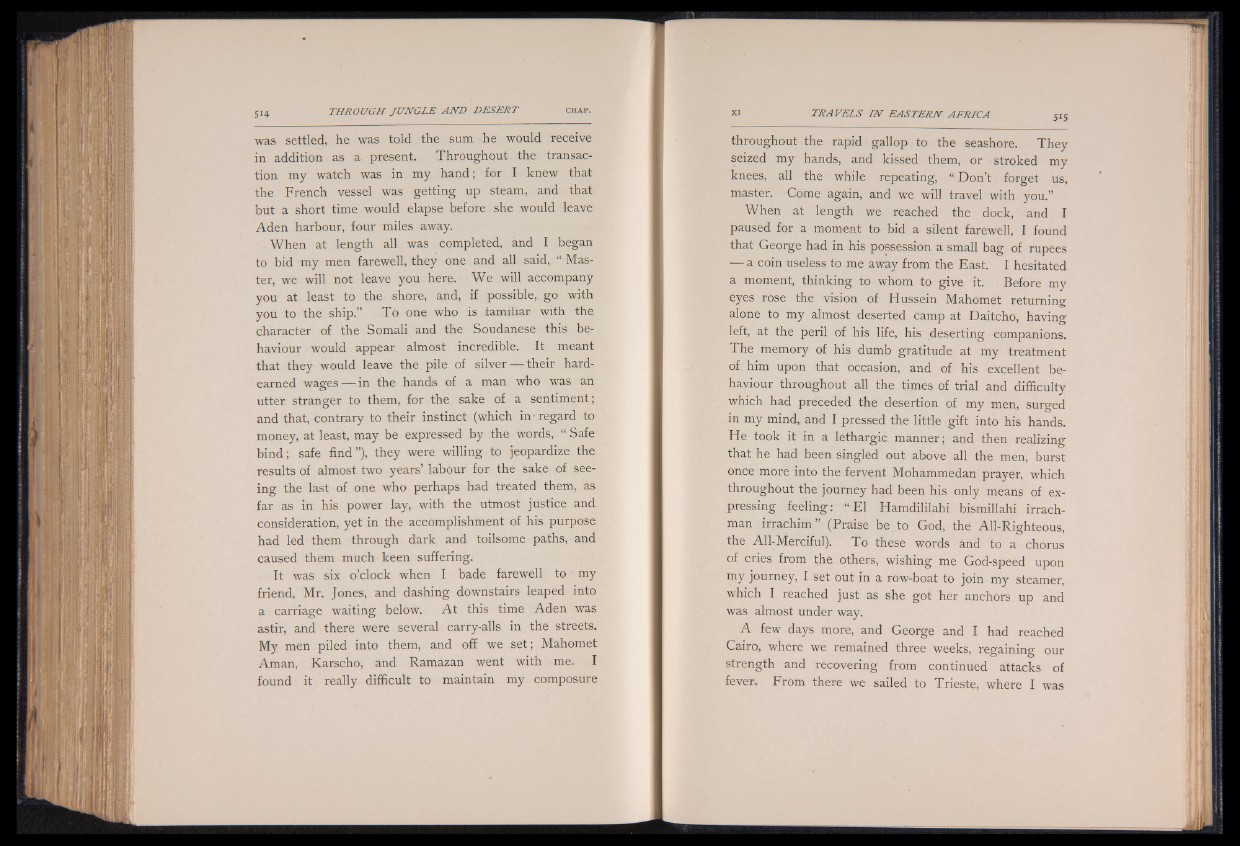
was settled, he was told the sum he would receive
in addition as a present. Throughout the transaction
my watch was in my hand; for I knew that
the French vessel was getting up steam, and that
but a short time would elapse before she would leave
Aden harbour, four miles away.
When at length all was completed, and I began
to bid my men farewell, they one and all said, “ Master,
we will not leave you here. We will accompany
you at least to the shore, and, if possible, go with
you to the ship.” To one who is familiar with the
character of the Somali and the Soudanese this behaviour
would appear almost incredible. It meant
that they would leave the pile of silver — their hard-
earned wages — in the hands of a man who was an
utter stranger to them, for the sake of a sentiment;
and that, contrary to their instinct (which in • regard to
money, at least, may be expressed by the words, “ Safe
bind; safe find”), they were willing to jeopardize the
results of almost two years’ labour for the sake of seeing
the last of one who perhaps had treated them, as
far as in his power lay, with the utmost justice and
consideration, yet in the accomplishment of his purpose
had led them through dark and toilsome paths, and
caused them much keen suffering.
It was six o’clock when I bade farewell to my
friend, Mr. Jones, and dashing downstairs leaped into
a carriage waiting below. A t this time Aden was
astir, and there were several carry-alls in the streets.
My men piled into them, and off we set; Mahomet
Aman, Karscho, and Ramazan went with me. I
found it really difficult to maintain my composure
throughout the rapid gallop to the seashore. They
seized my hands, and kissed them, or stroked my
knees, all the while repeating, “ Don’t forget us,
master. Come again, and we will travel with you.”
When at length we reached the dock, and I
paused for a moment to bid a silent farewell, I found
that George had in his possession a small bag of rupees
— a coin useless to me away from the East. I hesitated
a moment, thinking to whom to give it. Before my
eyes rose the vision of Hussein Mahomet returning
alone to my almost deserted camp at Daitcho, having
left, at the peril of his life, his deserting companions.
The memory of his dumb gratitude at my treatment
of him upon that occasion, and of his excellent behaviour
throughout all the times of trial and difficulty
which had preceded the desertion of my men, surged
in my mind, and I pressed the little gift into his hands.
He took it in a lethargic manner; and then realizing
that he had been singled out above all the men, burst
once more into the fervent Mohammedan prayer, which
throughout the journey had been his only means of expressing
feeling : “ El Hamdililahi bismillahi irrach-
man irrachim (Praise be to God, the All-Righteous,
the All-Merciful). To these words and to a chorus
of cries from the. others, wishing me God-speed upon
my journey, I set out in a row-boat to join my steamer,
which I reached just as she got her anchors up and
was almost under way.
A few days more, and George and I had reached
Cairo, where we remained three weeks, regaining our
strength and recovering from continued attacks of
fever. From there we sailed to Trieste, where I was